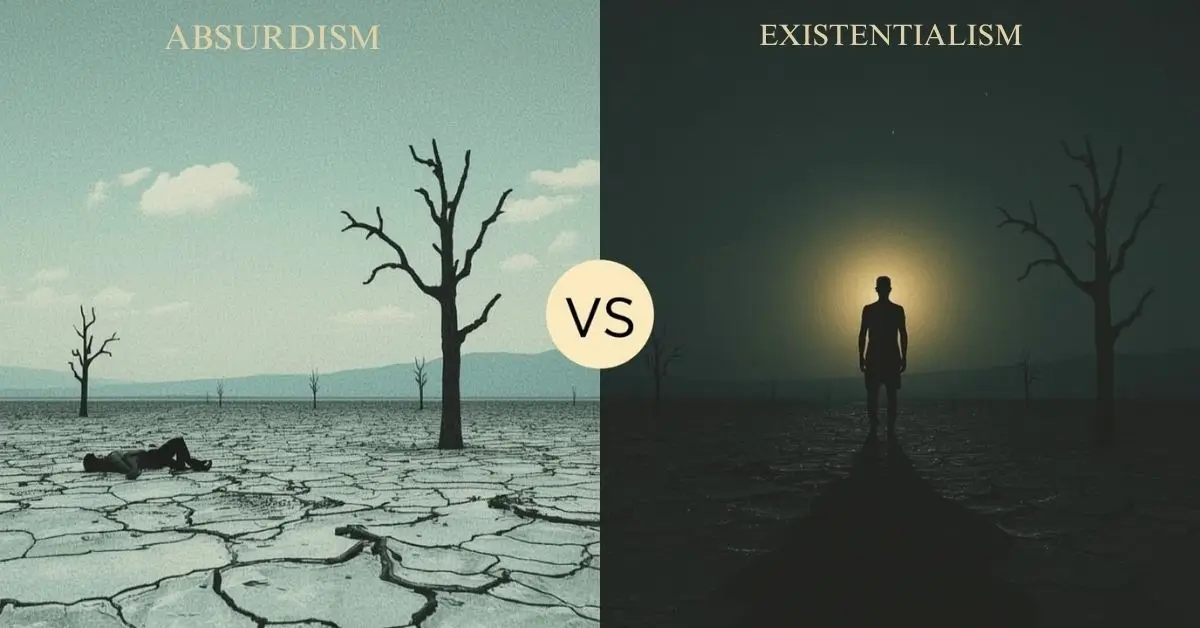If you’ve ever stared at the ceiling at 2 a.m. wondering whether life has any meaning, you’re not alone. Whether you’re a philosophy student unraveling the threads of human thought, a content creator seeking deeper truths, or someone in the throes of an existential crisis, the clash between absurdism vs existentialism is not just academic, it’s personal.
These two philosophical powerhouses attempt to answer life’s most daunting question: what do we do when life feels meaningless? Understanding their differences isn’t just intellectually enriching, it’s a toolkit for navigating modern existence.
What’s the Difference Between Absurdism and Existentialism?

Let’s get one thing straight: both absurdism and existentialism recognize that the universe doesn’t hand us a clear-cut meaning. But they diverge dramatically in how we should respond to that realization.
| Philosophy | Core Premise | Response to Meaninglessness |
| Absurdism | Life is inherently absurd; there’s a disconnect between our search for meaning and the universe’s silence | Embrace the absurd, live without appeal |
| Existentialism | Life has no inherent meaning, but we can create our own through choice and responsibility | Choose your essence through freedom |
Absurdism Explained: The Camusian Revolt
Absurdism is closely tied to Albert Camus, especially in his iconic work The Myth of Sisyphus. Camus argued that the human desire for clarity clashes with the indifferent universe—a situation he called the absurd.
“The absurd is born of this confrontation between the human need and the unreasonable silence of the world.” – Camus, The Myth of Sisyphus
Instead of despair, Camus suggests revolt: continue living, continue questioning, even without hope of answers. This is the heroic stance of Sisyphus, who eternally rolls a boulder uphill knowing it will always roll back down.
Coping with Absurdity (Without Nihilism)
- Don’t seek false hope or artificial belief systems
- Embrace the absurd condition
- Find personal joy in defiance
Expert Citation:
- Camus, A. (1942). The Myth of Sisyphus. Gallimard.
Sartre’s Existentialism: Radical Freedom and Responsibility
Jean-Paul Sartre, on the other hand, asserted in Being and Nothingness that while life is meaningless, we are free to create our own essence through choices. This is the famous existentialist mantra: existence precedes essence.
“Man is nothing else but what he makes of himself.” – Sartre, Existentialism is a Humanism
Where Camus stops at rebellion, Sartre pushes into action. Freedom becomes both a gift and a burden.
Existentialist Themes in Everyday Life
- You are what you do—not what you intend
- Responsibility is total; even choosing not to choose is a choice
- Anxiety and anguish are natural outcomes of freedom
Expert Citation:
- Sartre, J-P. (1943). Being and Nothingness. Routledge.
Kierkegaard and Existentialism: Faith in the Absurd?
Though chronologically earlier, Søren Kierkegaard is often considered the father of existentialism. His work focused on the individual’s relationship with God, and he introduced the idea of a “leap of faith” to overcome despair.
Unlike Camus and Sartre, Kierkegaard embraced belief but not without acknowledging the absurdity of faith itself.
Expert Citation:
- Kierkegaard, S. (1843). Fear and Trembling. Penguin Classics.
Absurdism vs Existentialism Simplified: Key Differences
Belief in God:
- Absurdism: Agnostic/atheistic
- Existentialism: Variable (atheist to religious existentialism)
View on Meaning:
- Absurdism: No inherent meaning; accept this and live freely
- Existentialism: Create your own meaning through choices
Response to the Absurd:
- Absurdism: Revolt without appeal
- Existentialism: Accept freedom and responsibility
Optimism Level:
- Existentialism often seen as more optimistic due to its creative potential
Philosophical Difference Between Absurdism and Nihilism
It’s crucial not to conflate absurdism with nihilism.
| Term | Stance on Meaning | Life Approach |
| Nihilism | No meaning, and it doesn’t matter | Often leads to apathy or despair |
| Absurdism | No meaning, but we care anyway | Embrace the struggle defiantly |
Examples of Absurdism in Literature
- Franz Kafka – The Trial, The Metamorphosis
- Albert Camus – The Stranger, The Plague
- Samuel Beckett – Waiting for Godot
Which is More Optimistic: Existentialism or Absurdism?
It depends on your perspective:
- Existentialism offers agency: you can build meaning.
- Absurdism offers release: you don’t need to build meaning to live joyfully.
Real-World Takeaway for Students and Creators
Both philosophies offer tools to navigate mental health, creative paralysis, and identity crises:
- Use existentialism to own your choices and overcome passivity.
- Use absurdism to release perfectionism and accept life’s ambiguity.
Final Thought:
Whether you’re quoting Camus in a philosophy paper or pondering your next big life decision, absurdism vs existentialism is more than a theoretical debate. It’s a mirror. What you see in it and what you do next might just define your existence.
FAQ’s
Q: What’s the difference between absurdism and existentialism?
A: Absurdism accepts life’s lack of meaning and encourages rebellion without appeal. Existentialism says you can create meaning through your actions.
Q: Is absurdism a form of existentialism?
A: They share roots, but absurdism (especially Camus’) is philosophically distinct.
Q: Why did Camus reject existentialism?
A: Camus believed existentialism falsely promised meaning through individual will, which he thought was intellectually dishonest.
Q: Can existentialism cure nihilism?
A: Yes—by proposing we create meaning through freedom and responsibility.
Q: How do existentialists respond to the absurd?
A: They acknowledge it but insist we’re free to define ourselves in spite of it.
Q: What does Camus mean by the absurd?
A: The conflict between our desire for meaning and the universe’s silence.
Q: Absurdism vs existentialism for beginners?
A: Think of absurdism as embracing the meaningless and laughing; existentialism as rejecting the void by building meaning.











